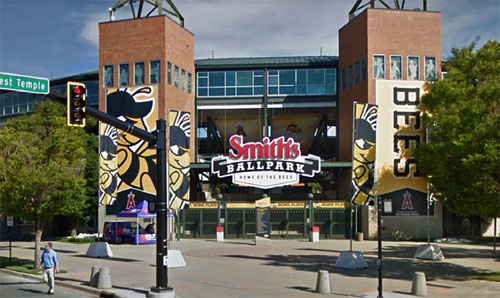By Brice Wallace
Don’t be surprised if you attend a sports event later this year in a full house. Or maybe in a sparse crowd sprinkled throughout the arena. Or alone, catching screen time at home because fans aren’t allow in the venue.
Or all of the above, depending on the week.
That’s the reality facing organizers of athletic competitions, thanks to the COVID-19 pandemic. It could just as easily apply to conventions, church services or schools.
Speaking during a webinar about large-group situations, Mark Harlan, athletic director at the University of Utah, said the university’s event management team has been working “to really look at different strategies that would provide safety first for our student-athletes and all those participating in staging the game and also for our fans.”
That could mean playing football this fall in a sold-out stadium — the norm for Rice-Eccles Stadium for the past decade — or before limited crowds spread throughout the stands. It could mean staggering the entrance times for fans.
“All are logical and all are doable,” Harlan said during the webinar, hosted by the Marriner S. Eccles Institute at the UofU’s David Eccles School of Business. The university also is considering using only digital tickets and spacing out people in concession lines.
“Whatever at that time that makes the most sense, we’ll be ready to deploy,” Harlan said.
“The one thing that’s really important to me and all the folks working on this is we need to make everybody comfortable when they come into the stadium,” he said. “We’re turning over every stone, working with our stadium partners, but the thing that we know is true is we’re going to focus on safety, but we’re also going to focus on the ability for us to do it in the best possible way.”
As for road games, Harlan, a chair of the football subcommittee of the Pac-12 conference and who represents the conference on the NCAA Division I Football Oversight Committee, said he believes managers of those venues “will be following really good protocols” to keep all student-athletes, game workers and fans safe.
Harlan said university officials will talk to season-ticket holders and others during the 30-60 days to get new ideas and opinions about ones already developed. He said he will “not be wedded to any single idea.”
“That’s the one thing I’ve really learned — where you think you have something, a couple of weeks later, maybe it doesn’t make sense,” he said.
Being nimble has worked well for Utah’s Hogle Zoo. It reopened to a limited number of visitors, who had to observe social distancing, make reservations online, enter during a certain time frame, and travel in one direction through the zoo. Officials watched and made adjustments accordingly, needing “to be able to pivot on a dime,” said Erica Hansen, the zoo’s community relations manager.
“One of the lessons I think that surprised us is, all of your plans will almost get tossed out the window and almost immediately, because I think what we’ve learned through this virus is that it’s changing all the time,” she said. “So we have learned to be very flexible. We’ve learned to be very adaptive.”
Like the UofU is planning, the zoo got feedback and ideas from visitors, the zoo using social media.
“We found half the audience was very eager to come back to the zoo and then you found the other audience that wants to just wait and see what happens over the next couple of weeks,” Hansen said. But through social media, those who were hesitant saw their friends came, felt safe and posted photos about their visit, making everyone feel safer about attending.
“So, as businesses start reopening, be sure you’re really engaging your social media audiences because that’s your community,” Hansen said.
The webinar’s moderator, former Gov. Mike Leavitt, said large-crowd venues will be like everyone else in tackling the impacts of the virus: learning and adjusting.
“This is a long-term process that we’re learning to manage,” Leavitt said, “not one we’re going to be able to solve overnight.”








